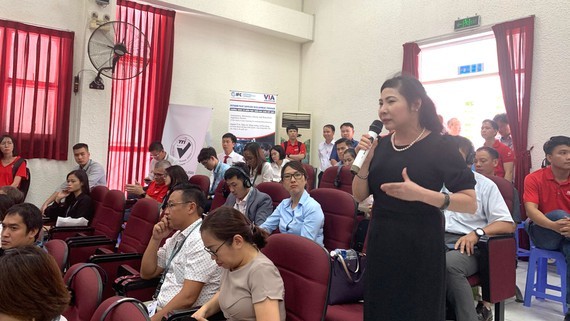
Finding common grounds
Vietnamese manufacturers are stepping up their game in producing high value-added products such as motor cores, electronics chips or circuit boards, in addition to the usual bolts and screws, manufacturing molds, and plastic and paper-based packaging.
Tuong Vinh Company, a manufacturer of electric motors, expressed their desire to become a supplier of motor equipment and machinery products for the Hong Kong based Techtronic Industrial Group (TTI), and asked TTI to make public their criteria in selecting suppliers. Tuong Vinh’s representative stated they had already joined the supply chains of many Japanese, Korean and European enterprises. The company has been in operation for more than 20 years and owns a supporting industrial product factory covering 40,000m2 with 1,000 workers and technicians.
On the other hand, Duy Khanh Mechanical Production Co., Ltd. stated that Vietnamese manufacturers are at financial risks if FDI enterprises turn them down after they have built expensive supporting industry product facilities. They proposed official agreements to be signed between foreign investors that want to localize supporting industry products and their suppliers of choice.
Another proposal from Vietnamese companies was to have flexible payment policies to better facilitate their working capital, especially small and medium-sized companies. This proposal stemmed from the concern that most FDI groups require orders to be delivered within 14 working days but allow late payment of up to 90 days.
Promoting Vietnamese products’ competitiveness
Many FDI enterprises at the forum acknowledged the progress that Vietnamese companies made regarding supporting industrial products. Specifically, they met all 5 requirements from FDI groups to join the supply chain regarding hazardous substances, environmental safety, human resources, product quality, factory security. The Vietnamese companies also raised product quality from 51% to 88% after 2 months of improvements.
“Vietnamese companies are more than capable to join foreign supply chains, assuming that their leaders are willing to change the business model”, said Deputy Director of Ho Chi Minh City Center of Support Industries Development Le Nguyen Duy Anh.
Thanks to the Center’s efforts since 2018 to help domestic companies improve capacity, reduce rate of defects, and improve management, more than 30 HCMC-based businesses managed to join the supply chains of Samsung Group, Schneider, Sony, Honda, Sanyo and many more.
Additionally, they worked with many FDI corporations to provide expert assistance and work with financial institutions to offer Vietnamese suppliers more flexible payment policies.
It takes an average of 30 days for FDI corporations to launch a new product, and even shorter for high-tech products, Mr. Anh said. This means supporting products must be available within 14 days of ordering. Therefore, having an on-site supply chain will help ensure production progress as well as reduce logistics costs for FDI corporations. A strong domestic supply chain of supporting industry products should be considered the main factor to attract foreign investment.
Deputy Head of Ho Chi Minh City Hi-tech Park Le Bich Loan said the park’s management board is persuading multiple FDI corporations into making investments in Vietnam in general and Ho Chi Minh City in particular. They want to prioritize groups that focus on developing 4.0 technologies and innovative products. She also stressed that Vietnamese businesses need to reconsider their own products’ competitiveness.
























